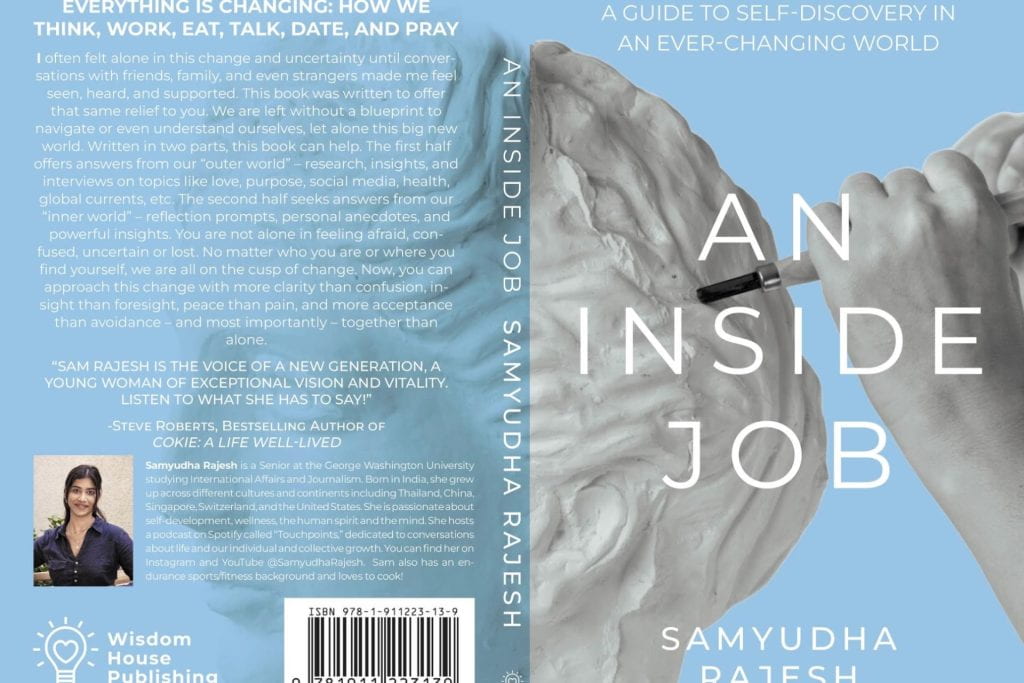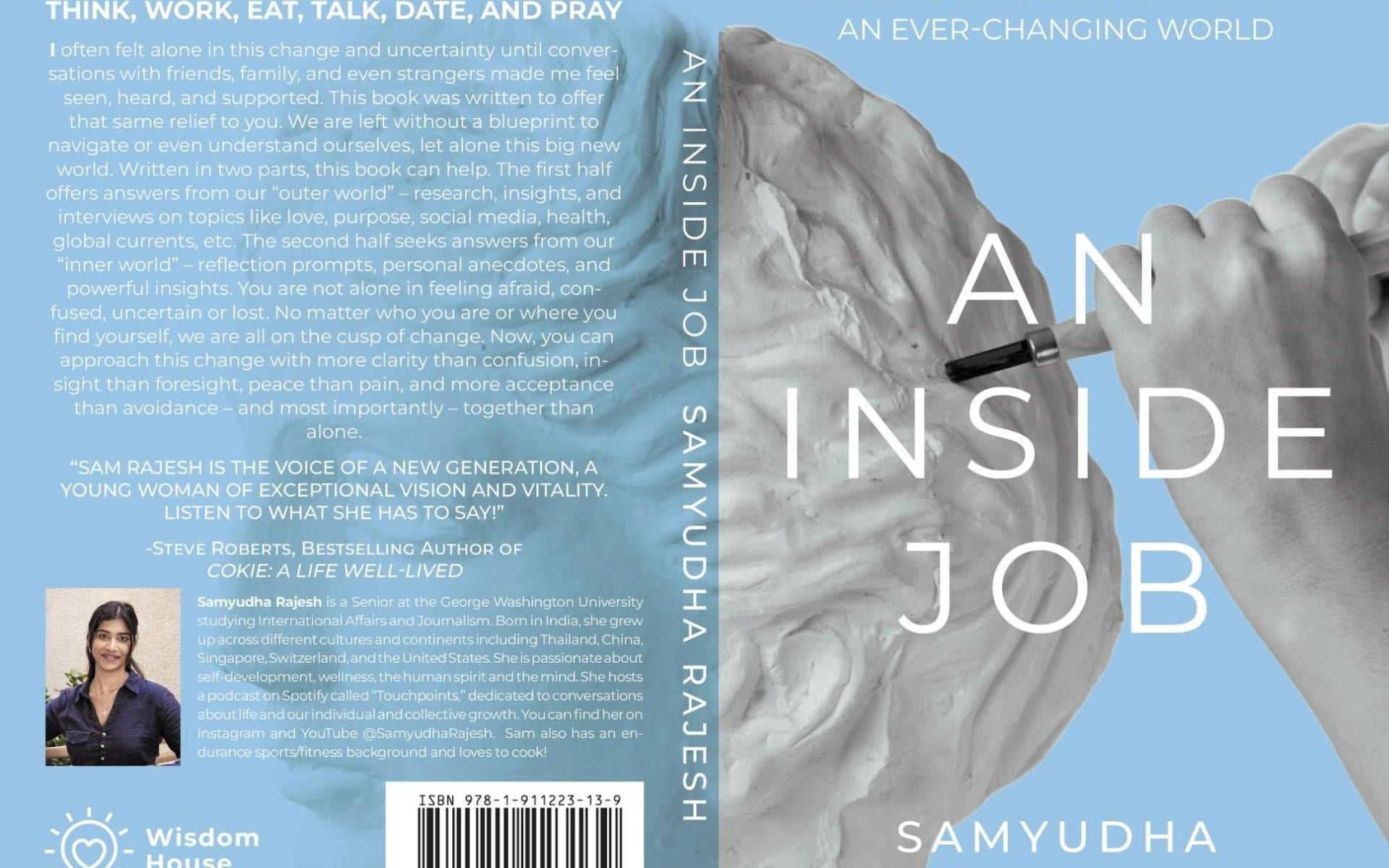by Shawn Calmes

Samyudha Rajesh, a senior at the Elliott School of International Affairs, has just published her debut book, “An Inside Job: A Guide to Self-Discovery in an Ever-Changing World,” aimed at guiding young adults through self-discovery.
Born in India, Rajesh grew up in different cultures and continents, including Thailand, China, Singapore, Switzerland, and the United States. She is passionate about self-development, health and wellness, human relationships, and the human mind and spirit.
In her book, Rajesh draws from her own experiences of feeling lost and confused with the state of the world. Read the extended Q&A with the author here.
Q: What inspired you to focus on self-discovery in our changing world, and how have your studies influenced the book?
A: In all honesty, this book was born out of months of feeling lost and confused within myself and the state of the world around me. I had many questions about why things were the way they were – not excluding – why I was the way I was. Over the summer, when I had a lot more time, I began reading random articles and books and listening to podcasts about different topics I was curious about. I also started doing a lot of journaling and reflection, trying to understand myself and what I really wanted in life. At some point, those two converged, and I realized that understanding myself was the starting point to understanding other people and the world around me. I think much of what I have learned in international affairs and international development has given resonance to this idea. Moreover, sometimes the biggest, most complex, and seemingly impersonal issues bear their solutions in the smallest, simplest, and most personal domains. We can draw parallels between the tensions of two parties or two countries in much the same way we think about tensions between two individuals and their interpersonal struggles.
Q: Your book is divided into two parts, addressing the “outer world” and the “inner world.” How does this structure help tackle questions about personal and global identity?
A: In bridging the “outer” and “inner” world, I want people to realize how and why they are affected by the world around them but equally, to realize how and why they have the power to influence the world too. Seeing these two things – not as separate entities in silos – but as being deeply intertwined and reinforcing, can open our world up a lot more. Maybe with this new and enlarged view, your world seems less like a series of unexplainable events and more like a complicated but beautiful web of cause and effect. Feeling more grounded and at home with yourself inevitably makes it easier to find your place in this world too. Similarly, when we can make meaning of our own identities and experiences, we can add meaning to the things we are part of and the people we are with.
Q: Who do you hope to impact with your book, and what kind of influence do you anticipate it having on young adults navigating uncertainty?
A: I hope to offer a sense of reflection, understanding, ease, and togetherness for everyone navigating change and uncertainty in their lives – which is all of us at some point or the other. However, in particular, I really hope to offer some relief to young adults (like myself) who are navigating so much change and uncertainty within and about themselves and the world around them at the same time. If I am being honest, I feel like being in your twenties is a string of existential crises. For example, not knowing what to do in life, trying to reconcile what you are “supposed to” with what you want to do, constantly wondering if you made the right decisions, fearing that you’ll end up alone, feeling like you are the only one struggling when everyone else has it figured out – it can all be very exhausting. I hope that by reading this book, people can learn more about the world today by looking at recent trends and patterns in research and data. This might validate how they already feel or change how they feel entirely. I also hope the book gives people the safe space to look deeper into themselves and finally spend some time getting to know that person – their likes, dislikes, values, purpose, dreams, deep-seated fears and insecurities, unanswered questions, and answers – that lie just as much within themselves as around them.
Q: Can you share some challenges you encountered while writing this book and any unexpected insights you discovered?
A: I think the biggest challenge I encountered in writing was to reconcile going deeper with casting a wider net. I wanted to touch on a variety of relevant topics like dating, social media, purpose and profession, religion and spirituality, and global currents whilst keeping focus on the inner experience. I also think it
can be hard to achieve the perfect balance between statistics and stories because different readers will resonate differently with both. This entire process definitely taught me to become less attached to my work, because so much of writing is re-thinking and re-writing what you once thought was “set in stone”. In other words, I had to be more flexible and open and realize that what I intend to convey and what is actually conveyed might not always be identical – and that’s okay.
Q: With your book launching soon, what are your future plans, both in writing and your professional career?
A: I am still exploring different opportunities in my professional career, but I am passionate about the intersection of human behavior, organizational sciences, and social psychology in the context of multinational corporations and international organizations. I am particularly fascinated with the concepts of conflict resolution and motivation. I hope to continue writing in the future and have a few potential ideas for my next book. However, my priority right now is to make the most of this journey and put my all into sharing this book with the world.
Q: Do you have any advice for other Elliott School students hoping to follow in your footsteps and become an author?
A: I would say if there is anything that you want to do – whether it is writing a book or something else – don’t wait for the right moment or opportunity to hit you. Sometimes you have to make your own experiences and create your own timeline. You “become ready” when you decide you are ready to do that thing you have always been wanting or meant to do.
In terms of more specific writing advice, I would say find a spot that you can focus well in and feel good in. I wrote most of this book in between two places – the third floor of Gelman Library and Foxtrot Cafe in Georgetown. Creating a sort of routine with writing helped me a lot. As with working out, picking a time in the day to dedicate to writing and then sticking to it is great for consistency. I also kept a notes app on my phone to jot down random ideas I thought of or information I learned throughout the day. Writing is honestly more reading and rewriting than anything else, whether that means reading other books and articles to refine your thoughts or re-reading your own work constantly to make it better.
About the Author:
Samyudha Rajesh is a Senior at the George Washington University studying International Affairs and Journalism. Born in India, she grew up across different cultures and continents including Thailand, China, Singapore, Switzerland, and the United States. She is passionate about self-development, health and wellness, human relationships, and the human mind and spirit. She hosts a podcast on Spotify called “Touchpoints,” dedicated to conversations about life and our individual and collective growth. You can find her on Instagram @SamyudhaRajesh. Sam also has an endurance sports/fitness background and loves to workout and cook in her free time.

